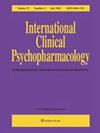Prospective, comparative, pilot study of maintenance treatment in comorbid bipolar disorders with post-traumatic stress disorder.
IF 2.5
3区 医学
Q3 PHARMACOLOGY & PHARMACY
引用次数: 0
Abstract
There is limited real-world evidence that evaluates the impact of monotherapy vs. combination therapy as a maintenance treatment in comorbid post-traumatic stress disorder (PTSD) in bipolar disorder (BD). Our aim was to compare lithium vs. lithium plus quetiapine in maintenance treatment in a sample of comorbid BD with PTSD. An exploratory, comparative pilot study over a 28-week period in 34 comorbid BD with PTSD patients was performed to compare monotherapy (n = 18) vs. combination therapy (n = 16) during maintenance treatment. The primary outcome was the time to event of recurrence of any mood episode. The secondary outcomes were regarding change from the baseline to endpoint in the Montgomery-Asberg Depression Rating Scale (MADRS) and Young Mania Rating Scale (YMRS). A Cox regression, Kaplan-Meir survival, and mixed-effects model for repeated measures analyses were performed. Lithium plus quetiapine reduces the risk of recurrence of any mood episode. There are significant differences between baseline and endpoint for YMRS, MADRS, and CGI-BP scales in the sample. In this pilot, exploratory analysis, combination therapy during maintenance treatment for comorbid BD with PTSD may be effective in preventing recurrences of any type of mood episode.对合并有创伤后应激障碍的双相情感障碍患者进行维持治疗的前瞻性比较试验研究。
在双相情感障碍(BD)患者合并创伤后应激障碍(PTSD)的维持治疗中,评估单一疗法与综合疗法的影响的实际证据非常有限。我们的目的是在双相情感障碍合并创伤后应激障碍的样本中,比较锂与锂加喹硫平的维持治疗效果。我们对34名合并躁狂症和创伤后应激障碍的躁狂症患者进行了为期28周的探索性比较试验研究,比较了维持治疗期间的单一疗法(18人)与联合疗法(16人)。主要结果是任何情绪发作复发的时间。次要结果是蒙哥马利-阿斯伯格抑郁评定量表(MADRS)和青年躁狂评定量表(YMRS)从基线到终点的变化。研究人员进行了Cox回归、Kaplan-Meir生存率和重复测量混合效应模型分析。锂联合喹硫平可降低任何情绪发作的复发风险。样本中的YMRS、MADRS和CGI-BP量表在基线和终点之间存在明显差异。在这项试验性、探索性分析中,在对合并有创伤后应激障碍的BD患者进行维持治疗期间,联合疗法可有效预防任何类型的情绪发作复发。
本文章由计算机程序翻译,如有差异,请以英文原文为准。
求助全文
约1分钟内获得全文
求助全文
来源期刊
CiteScore
4.40
自引率
23.10%
发文量
97
审稿时长
>12 weeks
期刊介绍:
International Clinical Psychopharmacology provides an essential link between research and clinical practice throughout psychopharmacology. It reports on studies in human subjects, both healthy volunteers and patients, which relate the effects of drugs on psychological processes.
A major objective of the journal is to publish fully refereed papers which throw light on the ways in which the study of psychotropic drugs can increase our understanding of psychopharmacology. To this end the journal publishes results of early Phase I and II studies, as well as those of controlled clinical trials of psychotropic drugs in Phase II and IV. Other topics covered include the epidemiology of psychotropic drug prescribing and drug taking, the sociology of psychotropic drugs including compliance, and research into the safety and adverse effects of these compounds.

 求助内容:
求助内容: 应助结果提醒方式:
应助结果提醒方式:


